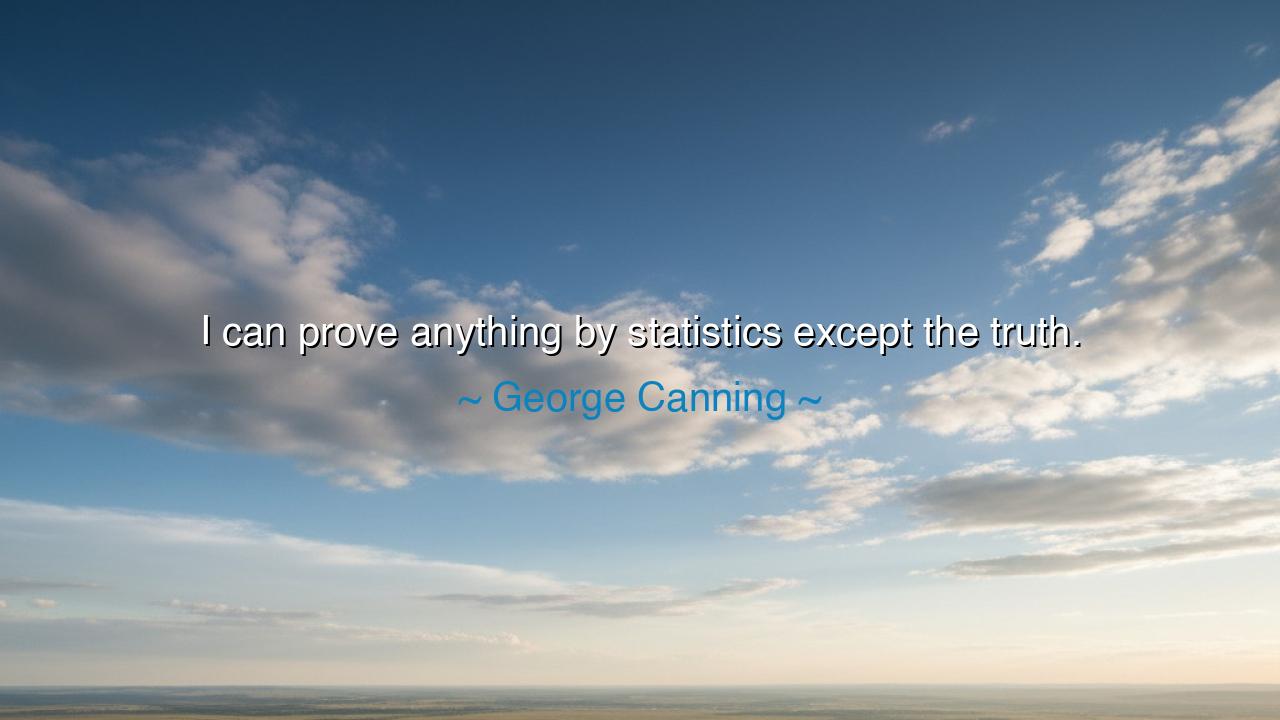
I can prove anything by statistics except the truth.






Hear, O seeker of wisdom, the words of George Canning: “I can prove anything by statistics except the truth.” In this utterance lies a warning for all who tread the path of knowledge. For the tongue of numbers is double-edged—it can both illuminate and deceive, raise men to glory and cast them into error. Canning, who walked the halls of power in the early 19th century, spoke with the insight of one who saw how men in politics twisted the sacred figures of fact to bend the minds of the people. His cry was not against numbers themselves, but against the unfaithful hand that wields them.
Consider, dear listener, how the ancients revered truth as the foundation of all law and order. To the Greeks, aletheia was not mere correctness, but the unveiling of reality, a stripping away of illusion. Yet statistics, when placed in the hands of those who hunger for power or profit, may cloak rather than reveal. A single measure, extracted from the whole, may be dressed in garments of certainty and offered as proof. Thus, falsehood gains the mask of wisdom, and the unwary are led astray.
Look to the annals of history and behold the tragedy of tobacco. For decades, when the smoke of industry filled the lungs of nations, men of science stood before the people with charts and figures declaring there was no danger. The numbers, carefully chosen and polished, concealed the growing tide of illness. Only later, when truth broke through the veil, did the world awaken to the devastation wrought. Here is the living testament to Canning’s words: statistics may serve a lie more loyally than they serve the truth.
Yet let us not condemn the numbers themselves. For in their pure form they are faithful servants. The fault lies in the spirit of man, who bends truth to desire. As a sword may defend the weak or slay the innocent, so too may statistics uphold justice or crush it. Thus, wisdom demands discernment—not blind trust in figures, but an eye sharpened to see how they are forged, and for what purpose they are wielded.
Know then, children of tomorrow, that the lesson is vigilance. When numbers are placed before you, ask: Who gathered these? For what cause were they arranged? What truths were left untold? The wise man does not drink from every cup without testing the water. In like manner, test every figure, every chart, every gleaming percentage. For behind them may lie the shadows of deceit.
Let your heart, therefore, be steadfast in pursuit of truth. Do not be dazzled by the brilliance of presentation, nor cowed by the authority of those who claim, “The numbers speak for themselves.” Numbers never speak; it is men who make them speak, and men may lie. Seek always the broader view, the context that surrounds the claim, and weigh it against reason and experience.
So I charge you: guard your mind with the shield of discernment. Celebrate the power of knowledge, yet temper it with caution. In your own life, practice honesty with numbers: whether in your work, your dealings, or your speech. Refuse to twist them to gain unfair advantage, and resist the lure of easy persuasion. For by this discipline, you will stand in the company of the truly wise, those who honor truth above victory, and reality above illusion.
And remember, as Canning’s words echo across the ages: statistics may prove many things, but only the courageous spirit, unbending and devoted, may walk the path of truth.






TTDang Thanh Thao
Canning’s quote makes me think about how statistics can obscure the truth rather than reveal it. We often rely on data to support our beliefs, but numbers alone can’t always capture the nuances of reality. How do we make sure that we’re using statistics ethically and accurately to uncover the truth, rather than just using them to confirm our biases or push certain narratives?
HTDoan Huy Toan
This quote by Canning brings attention to how easily statistics can be manipulated to support any claim. It’s fascinating how data can be twisted to make almost any argument seem valid. How do we, as consumers of information, ensure we’re not being misled by biased data? What steps can we take to critically evaluate statistics and their true meaning, especially when they’re presented to support particular agendas?
OTOt Tuong
Canning’s perspective makes me think about the limitations of statistics in understanding the truth. Statistics are useful tools, but they don’t always tell the whole story. How do we balance the use of statistics with other forms of understanding, like human experience and intuition? Can a number ever fully capture the truth of a situation, or is it always just part of a bigger picture?
NPNhi Pham
This quote is interesting because it points out how statistics can be used to prove almost anything, but they might not always capture the full truth. How often do we see data being used to mislead or confirm preconceived ideas? Is it possible to rely on statistics to uncover the truth, or do they only highlight certain aspects of a bigger, more complex reality?
TVTuong Vy
George Canning’s quote is thought-provoking because it highlights how statistics, while powerful, can sometimes be manipulated to support almost any argument. It makes me wonder: do we place too much trust in numbers and data without questioning the context or biases behind them? Can statistics ever truly reveal the whole truth, or do they just present one version of it based on how they’re interpreted?